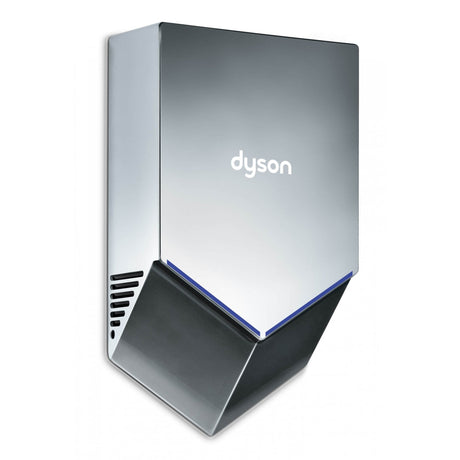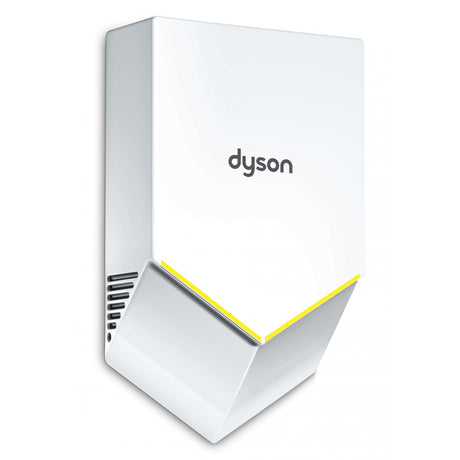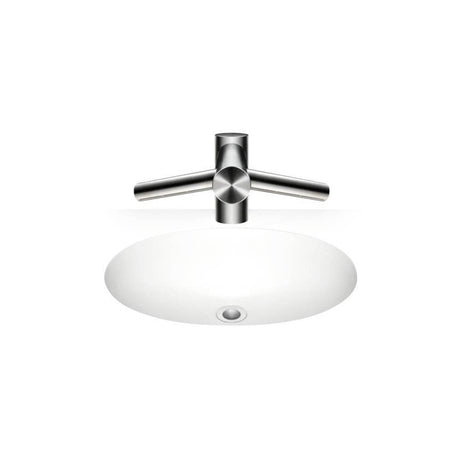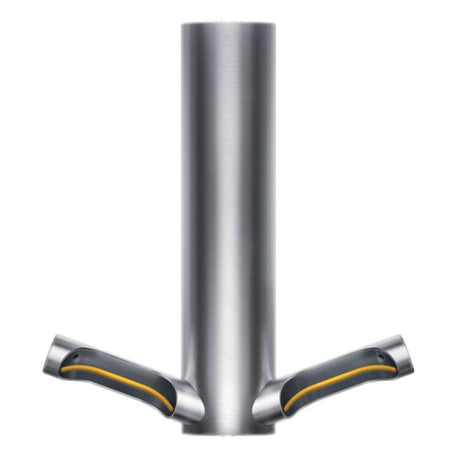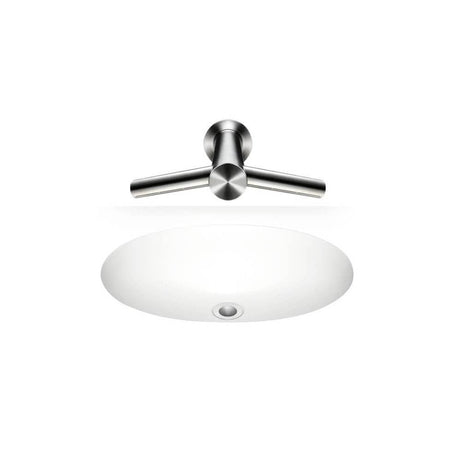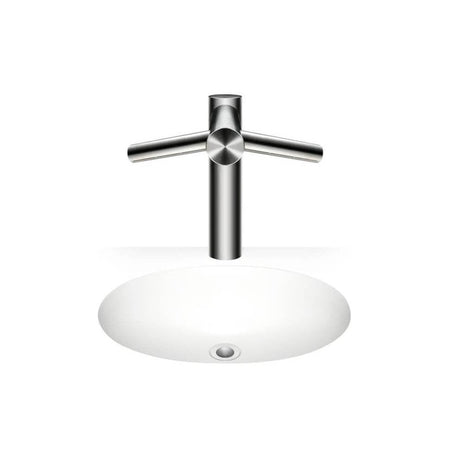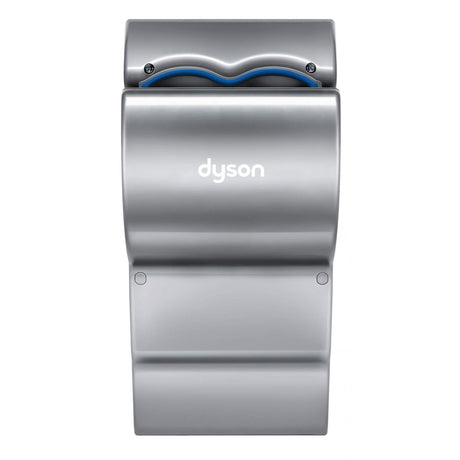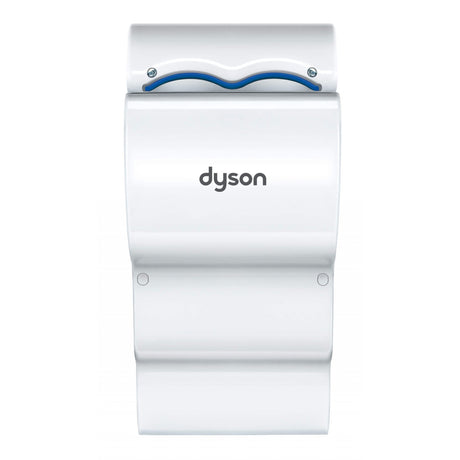Which Dyson Air blade hand dryer should I choose?
There are 4 Dyson Airblade hand dryers currently in the range, with the Dyson db (ab14) set to be discontinued in 2022. Which is the right Dyson dryer for you?
The original Dyson hand dryer design has gone through several upgrades and after 15 years is set to be discontinued. The ab14 or Dyson DB is the most recognisable Dyson hand dryer design. This model has a U-shape design with thin air apertures or ‘air blades’ that dry simultaneously from both sides. While this is still a super-fast dryer, the design does have flaws and it makes sense for Dyson to move to newer models. The main issue is that it is large but has no way of gathering the water, making the size largely unnecessary. The water drains down the side of the Dyson air dryer and therefore an additional drip tray needs to be purchased. Larger units contain more material and therefore have a higher production carbon footprint than more compact units. At 1.6kw and 80 db(A) it is also the least energy-efficient and loudest of the Dyson dryers.
The oldest dryer in the range characterised by the two angled blades of air that form a V-shape. This is by far the lowest cost option within the Dyson range. At just 1kw rated power and with a 12-second dry time, it is also very efficient as you would expect. It’s been re-engineered to improve the sound quality and is 50% quieter than the original model. It also has an easy to plug-in system so can be removed from the wall without the need for an electrician to service, change HEPA filters, clean or repair. Like all hands-under dryers, it has no means of capturing the water so does tend to spray walls and floors, due to the sheer velocity of the airflow. We have developed a patented, innovative evopar8 plate that overcomes this problem. Check out the full review of the Dyson Airblade V.
A brilliant design that will one day be the go-to solution in all washrooms. More than just a dryer, this product is the water tap that goes over the sink and the hand dryer, using the basin to remove all water, therefore solving the issue of wet floors and walls, which reduces cleaning times and improves hygiene. As a hand dryer, it's very effective and efficient, in line with other models – 14-second dry time and only 1kw rated power, as a tap, it’s made of marine-grade steel and instant start and cut off to reduce water consumption. The Dyson Airblade Wash and Dry creates additional space in washrooms and makes perfect sense, the installation is quicker than installing a dryer and tap separately, so contractors will be happy.
The only issue with the Wash and Dry is the high cost and the fact they are needed over every sink, so the cost escalates even further. With a normal high-speed hand dryer, it is fine to have 1 for every 3 sinks in most situations. Check out the full review
of the Dyson Airblade Wash and Dry
The newest model in the Dyson hand dryer range, the Airblade 9jk is a really interesting design, it has the fastest dry time, uses the least energy and has the lowest sound level! Sounds great, but the gains vs the Dyson Airblade V are quite low considering the extra price, it also suffers from the same issues of water spray and requires an evapor8 plate to overcome this.
Summary of Dyson hand dryers
If you want a Dyson at the very best price, choose the Airblade V, if you want the very best performance and interesting appearance, choose the 9kj. If cost is no issue and you want the most practical design solution for washing and drying hands then choose the Airblade Wash and Dry.
How does a Dyson Airblade work?
Dyson Airblades all use digital, brushless motor technology adapted from their vacuum cleaners. The speed of revolutions in Dyson motors is particularly unique, reaching up to 90,000 rpm on some models. The motor speed draws large volumes of air through a high-grade HEPA filter, then forces it out of fine apertures to create a high-pressure ‘Airblade’ that strips water from the hands.
Where does the water go on a Dyson Airblade hand dryer?
The discontinued Dyson Airblade ab14 had a particular design flaw, it stripped water from the hands however this water had nowhere to go, so
it pooled in the U-bend and eventually dripped down the sides, making a mess on the side of the dryer and wall. Older models that used a lacquer had a
particular issue as this tended to strip off where the water ran. The Airblade V sprays the water onto the wall and floor, as does the 9kj. The Wash & Dry
is the best design, as it strips water into the sink.
Is the Dyson Air blade Hygienic?
A research paper by the University of Bradford was submitted to the European Congress of Clinical Microbiology & Infectious Diseases, Munich, Germany in 2007 stating that using the Dyson Airblade lead to significantly less bacterial transfer. A paper by the University of London Trade Group confirmed the manufacturer's claim that it is 'the most hygienic hand dryer'. Accreditation has also been given by the Royal Society of Public Health.
The Dyson Airblade dB hand dryer and the Dyson Airblade Wash+Dry hand dryer have been certified for use in food preparation environments. Dyson hand dryers are globally certified as hygienic by HACCP International, the body responsible for products used in food-safe environments. Dyson also has the 3 models approved by the NSF which certify for healthcare environments.
The paper towel industry has been particularly keen to talk down Dyson as the leading manufacturer in the hand dryer industry, however, their hygiene claims are always based on unrealistic test conditions. If hands are washed effectively and then dried with a Dyson Airblade they have proven the highest hygiene standards. If people fail to wash their hands properly, hygiene will always be compromised.
How do I clean a Dyson Airblade hand dryer?
The basic instructions for the Airblade V and 9kj are covered below.
- Use a non-abrasive cleaner and soft cloth to wipe surfaces, paying particular attention to cleaning around air inlets/outlets and sensors, keeping clear of dust and debris.
- Clean the wall behind the wall which may mark particularly in high traffic areas (see evapor8)
- Mop the floor
- Do not pressure wash the machine. To clean HEPA filters in high traffic areas please contact us for a HEPA change kit.
For the Airblade Wash and Dry the instructions vary slightly:
- Clean all product surfaces, sink, mirror, and any walls or countertops.
- When complete remove the cleaning cap. Clean the air inlets on the base of the motor bucket (under sink).
- Other than that, the same general instructions apply.
Most professional cleaning chemicals can be used. The following may damage the unit - Alcohol-acid mixes, Alcohol Solvent /oil-based, Quaternary ammonium, Alkali-bleach mixes, Foaming ingredients, Bleach or abrasive cleaners. Cleaning instructions can be downloaded from the product
pages.
Are Dyson hand dryers the best?
They are certainly up there, they always come out among the fastest dryers in our tests and show excellent reliability. The newest models are also among the most efficient and they have worked hard to reduce noise from earlier models, however, they are not perfect and there are many factors to consider when buying a hand dryer for your facilities. Why don’t you check out our best hand dryers of 2025 for an overview or to see which product matches your requirements use our hand dryer selection guide.
Are there alternatives to Dyson dryers?
This is a question commonly asked, mainly due to budgets not stretching to Dyson prices. Below is a list of possible alternatives.
Dyson Airblade ab14 – Mitsubishi SMART, Steelforce, Jetforce Junior.
Dyson Airblade V – PHS Vitesse, Mitsubishi SMART, Airforce, G-Force Mark II.
Dyson 9kj – No direct alternative, very unique design but does the same job as any ‘hands under’ hand dryer.
Wash and Dry – Dryflow Bi-tap and Dryflow Tri-tap.
We have written a more in-depth blog looking at the best alternatives to the Dyson Airblade ab14, which given this model is being discontinued, you may find helpful.
Has your Dyson blade dryer stopped working?
Dyson provides a 5-year warranty as standard, please contact their customer service line, making sure you have your serial number available
and they will guide you through the troubleshooting steps or organise replacements. Call 0800-3457788.
Dyson Hand Dryers - A Revolution in Design
Launched in 2006 the Dyson Airblade hand dryer was a revelation in UK design. James Dyson was already a successful businessman when the product came out having started as far back as 1983 when the first cyclone vacuum cleaner was launched in Japan, licensed to the Apex brand. Dyson used the profits to set up his own venture in the UK, launching his first products ten years later.
The Airblade was revolutionary, utilising the same Dyson Digital Motor that had been developed for the Cyclone 13 years earlier. Hand dryers traditionally used a jet of hot air to dry hands, but Dyson's idea was that with a strong enough motor and some clever engineering, he could use a 'blade' of air that would literally strip the hands of moisture, rather than leaving it to evaporate!
Not sure if Dyson Airblade hand dryers are right for your premise? Contact us on 0114 3540047 to speak to one of our experts.



